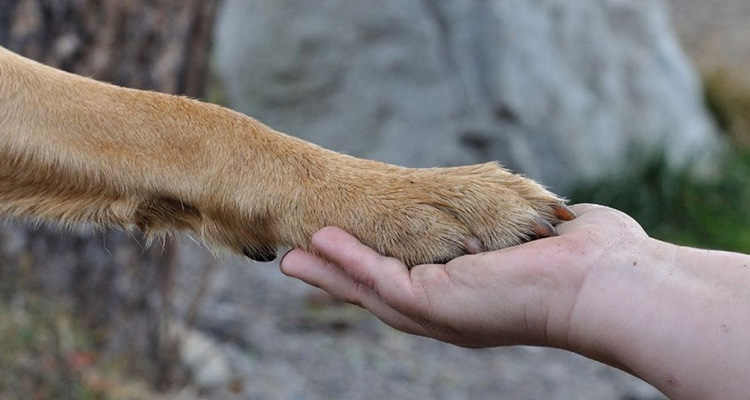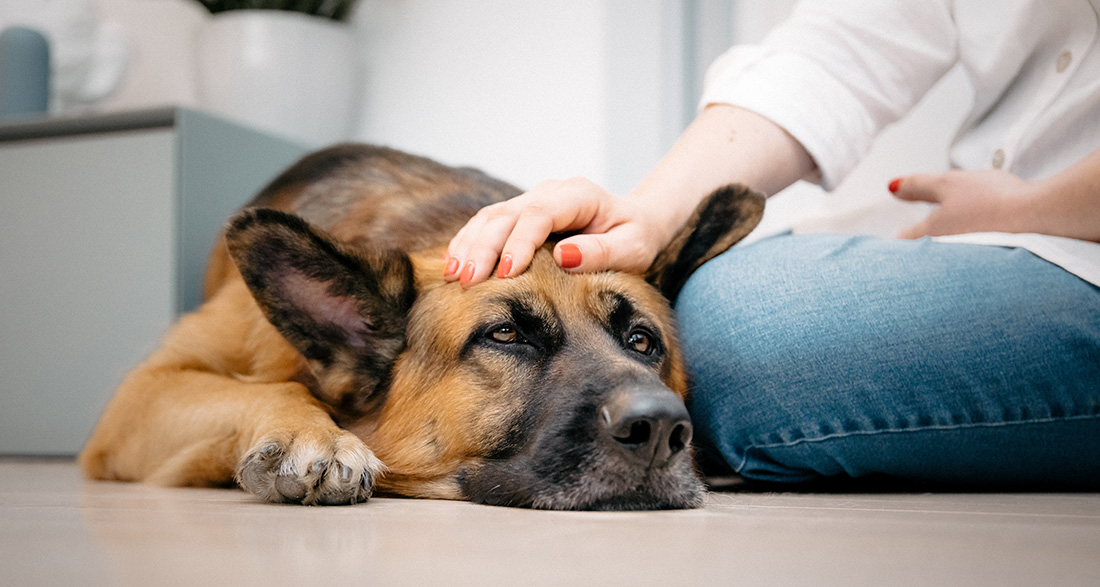If you notice signs that your dog is reaching the end of its life, you should not look away. The common wish among dog owners is that their best friend peacefully falls asleep after a long and happy life without any intervention.
Unfortunately, this is rarely the case. Most likely, you will have to make the decision for your dog and try to make the final phase of its life as comfortable as possible. Remember, you are not alone in making this decision! Your veterinarian can assist you and usually has the right comforting words when the time comes for your dog to pass away.
Can’t I just wait until my dog dies naturally?
We should not let our dogs unnecessarily suffer at the end of their lives. For example, if we were to abruptly stop much-needed heart medication, our pets would suffer greatly. The heart function of an enlarged heart would gradually decrease, leading to blood congestion and fluid accumulation in the lungs. The dog would feel as if it were drowning over the course of several days. This should never happen!
As our dog’s end of life approaches, whether due to old age, serious illness, or both, we, as dog parents, are called upon to act. The desire to avoid making the most difficult but essential decision for our pet is completely understandable, but we must not shy away from it. When your dog is ready to cross the rainbow bridge and pass away, you should be there for them and, together with your veterinarian, make the right decision.
We must not let our animals suffer, especially not at the end of their lives. No one should starve, thirst, or die in any other way. Especially not because the pet owner wants to avoid making a decision. In nature, a weakened animal would fall victim to the next larger predator; it would not starve for days.

When should I euthanize my dog?
This question cannot be answered universally. Every animal and every situation is unique. Therefore, you should thoroughly discuss this decision with your veterinarian. You know your dog best and can tell when your pet is only suffering. Your veterinarian will always act in the best interest of the dog and have a reasonable justification for euthanasia. They will only take this important step with you if it is genuinely necessary to say goodbye to the dog.
If you have already made the decision, you can also arrange for a home visit for euthanasia. No one should have to wait for the relieving injection in a busy waiting room for two hours. At home, the veterinarian can let the beloved pet cross the rainbow bridge in its familiar surroundings.
Checklist: Signs of a Dying Dog
The following signs may indicate that your dog is dying. Even if your dog is already old and lethargic, these signs are distinct. If you know your dog well, you will not overlook these signs. So, do not worry about missing the right time. Even the behaviors of an old dog will change in the final phase of dying.
If these symptoms occur, you should immediately contact your veterinarian:
- Lethargy and weakness
- Sunken face and/or significant weight loss
- Refusal to eat and drink
- Lack of mobility
- Pain during rest
- Anxious/confused behavior
- No food and water intake
These signs do not necessarily mean that your dog is inevitably dying. Still, they should be thoroughly examined by a veterinarian.
What to Do When My Dog Has Died?
If your dog has passed away peacefully at home, it is still necessary to inform your veterinarian and request a death certificate. You will need this for canceling the dog tax. If a veterinarian has euthanized your dog, the issuance of the death certificate usually occurs automatically.
You will also need to take care of your dog’s burial. Local crematoriums are often suitable for this purpose, offering options between individual and group cremation and the type of urn. There is still a chance to say goodbye. The death of a dog is a reason for mourning, and you must allow yourself and your family time for it.
FAQ
How long does the dying phase last for a dog?
Unfortunately, this cannot be answered universally. Dying involves the slow failure of organ functions, the gradual cessation of metabolism, as well as respiratory and heart functions, and brainwave activity. It can last weeks to months, making it a challenging phase for the animal, owner, and veterinarian.
What should I consider when my dog dies at home?
When death occurs, the grief for the beloved dog is significant. But what to do with the body?
Bury in the garden
If your dog has died a natural death and was not suffering from a notifiable disease, you can apply for burial in your own garden from the local veterinary office. This is usually not a problem.
Have it buried
You can also take your dog to a pet cemetery. Here, you can choose between a burial in the pet cemetery or cremation in an urn.
Animal body disposal
Not necessarily the most pleasant, but a legal and cost-effective alternative is municipal animal body disposal.
Can dogs die naturally?
Natural death, a “gentle sleep,” is probably the most beautiful and pleasant death. And, of course, everyone wishes that for their dog. The dog passes away peacefully, as nature intended. This is possible if you are well-informed, patient, and take enough time for it. Often, even a natural death does not necessarily occur peacefully.
If you feel confident enough to accompany your dog’s dying process, you should inquire more about this topic with your veterinarian. What exactly happens during the dying process? How can you accompany your dog in death?
When do most dogs die?
This cannot be answered universally. The lifespan of your dog depends on its size and breed. Of course, living conditions and care also play a role.
On average, dogs live to be 8-15 years old. Small dog breeds are said to live longer than large dog breeds. Small dogs can even live up to 20 years, while large dog breeds typically live up to 10 years. However, there are many exceptions.
It’s best to discuss this topic with your veterinarian.
How do dogs behave when they are in pain?
You know your dog best, so you can best recognize if it is acting differently than usual. Is it not sitting down anymore? Is it not lying down anymore? Is it limping on one leg? Or maybe it cannot get up anymore?
An increased breathing rate or whining, as well as flinching when you try to touch it in a particular area, may indicate pain.
If you’re not sure, it’s better to have your dog examined by a vet.
What happens to my dog when it dies?
You can take care of burying your dog in the garden. Simply call the responsible veterinary office for this.
You can choose between a pet cemetery or cremation and storage in an urn.
A less romantic but also possible solution is disposal at the local animal body disposal. Your veterinarian can also assist you with this.
What can be done to ease the dying process?
If you notice that your dog is not doing well and is only suffering, euthanasia can help relieve your dog’s pain.
You should discuss this decision with your veterinarian and only proceed with it if it is really necessary.
Your veterinarian will also provide tips if you want to accompany your dog naturally.
Does a dog say goodbye before it dies?
So far, it has not been conclusively proven whether dogs say goodbye to their humans just before death. Some dog owners report that their dog was more affectionate just before death. On the other hand, some dog owners say that their dog withdrew and wanted to die alone.
It doesn’t matter how your dog behaves before death. You should respect its wishes and neither leave it alone nor pressure it.


